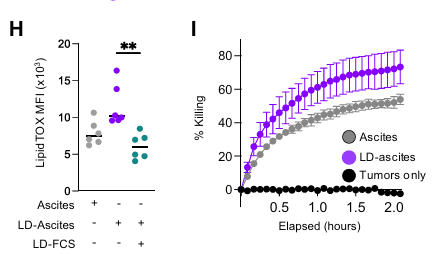|
Research Article Cites Cleanascite™ In Study of Lipid-driven Influences in Metastatic Ovarian Cancer Biotech Support Group reports on an article, describing the simplicity and efficiency of their lipid depletion product to study lipid influence in cell culture models of natural killer (NK) cells, from patients with High-grade serous ovarian cancer (HGSOC News Release
Research Article Cites Cleanascite™ In Study of Lipid-driven Influences in Metastatic Ovarian Cancer
MONMOUTH JUNCTION, NJ, May 13, 2025 -- Biotech Support Group reports on an article, describing the simplicity and efficiency of their lipid depletion product to study lipid influence in cell culture models of natural killer (NK) cells, from patients with High-grade serous ovarian cancer (HGSOC).
Slattery, Karen, et al. "Uptake of lipids from ascites drives NK cell metabolic dysfunction in ovarian cancer." Science Immunology 10.107 (2025): eadr4795.
Overall, we demonstrate that excess polar lipids, including PC(36:1), are a key driver of NK cell dysfunction and suppression of cytotoxic lymphocytes, in general, in ovarian cancer. Removing lipids from ascites abrogated the suppression of the immune system by ascites. Blocking the uptake of lipids through SR- B1 restored the activation and antitumor functions of NK cells in ascites, highlighting SR- B1 as a potential NK cell immunotherapy target.
“I
am so pleased to see the usefulness of Cleanascite™ in such an
important study of lipid influences on cancer metastasis. Unlike
alternative lipid-depletion methods that use solvents, Cleanascite™
is an aqueous suspension product and so it is very compatible with
cellular models of disease as shown here. The essential requirement
is the maintenance of all other factors required for cellular
activity after lipid depletion. We now have over 30 references in
cell response applications with Cleanascite™, many studying the
tumor microenvironment. With confidence that it does not introduce
confounding artifacts upon use, researchers can dispositively
determine the influence of lipid factors on phenotypic changes in
various disease models” states Swapan Roy, Ph.D., President and
Founder of Biotech Support Group. For
more information visit: Cleanascite™
Lipid Removal Reagent and Clarification,
at Keywords: High- grade serous ovarian cancer (HGSOC), metastatic ovarian cancer, Natural Killer Cells, NK cell dysfunction, ascites, tumor microenvironment, Cleanascite™, lipid depletion
About Biotech Support Group LLC
Converging
with cultural and technological disruptions forthcoming in
healthcare, Biotech Support Group develops methods for cost effective
and efficient sample prep essential for expanding proteomic analysis.
Following a tiered business strategy, the company continues its
growth in the consumable research products area. For this market, key
products include: AlbuVoid™ and AlbuSorb™ PLUS for
albumin & IgG depletion, Cleanascite™
for lipid adsorption, HemogloBind™ and HemoVoid™ for hemoglobin
removal, and NRicher™ for low abundance, family specific, and
targeted proteome enrichment. For more information, go to
http://www.biotechsupportgroup.com
For Business Development, contact: Matthew Kuruc 732-274-2866, mkuruc@biotechsupportgroup.com |

- About
- Products
- Hemoglobin Removal Kits
- Lipid Removal & Clarification
- Urine Protein & Low Abundance Enrichment
- Class Specific Enrichment
- Sample Prep Mass Spectrometry
- Functional & Chemical Proteomics
- Genomic Sample Prep
- Accessories
- Technical Resources
- References
- Publications & Reports
- FAQs
- Case Studies
- Cleanascite™ Unlocks Insights into Lipid-Driven Tumor Immunosuppression
- NRicher™ Bead Platform Provides Unique Sub-Proteome Biases And Fit For Purpose Opportunities for Targeted LC-MS Quantification
- BSG Products To Assist in Analyzing Macrophage Polarization
- Ectodomain Shedding and Enrichment of the Soluble Membrane Proteome
- Investigate out of the Venn Diagram box
- Methods to selectively deplete or purify Hemoglobin from Dried Blood Spots (DBS)
- The Utility of HemoVoid™ is Demonstrated in 3 Proteomic Investigations Identifying Potential Disease Specific Biomarkers
- The 4 common features of our sample prep products, known as the BSG Advantage, are highlighted in a selection of journal references.
- AlbuVoid™ Workflows Advance Cell Secretome Proteomics
- Lipid Removal for Phenotypic Cell Response in Cancer Research
- The Influence of Sample Prep Bias on LC-MS Targeted Peptide Quantification in Serum Proteomics
- Re-imagining proteomics for developing precision medicine biomarkers of the innate immune response in SARS-CoV-2
- Patent Application Describes New Proteomic Methods to Monitor Protease Inhibitor Function During Covid-19 Infections
- Efficient Hemoglobin Removal Advances Red Cell Proteomics Offering Many New Insights Into Inflammation and Infectious Disease
- The Potential for New Blood Biomarkers in the Management of COVID-19 Disease
- Establishing the Utility of HemoVoid™ and HemogloBind™ as Enrichment Tools for Proteomic Analysis of Red Cells and Whole Blood in Parkinson’s Disease
- Species Diversity Supported By BSG Products
- Poster Report Describes Loss of Functional Serpin Activity In Cancer Patient Blood
- AlbuVoid™️ PLUS & AlbuSorb™️ PLUS Evaluating Different Windows of Observation Solves The Many Challenges of Serum Proteomics
- Tackling the Challenges of Serum Proteomics
- Lipid Removal Sample Prep for Cell Response Applications
- Sample Prep for Proteomic Analysis of Saliva
- Biotech Support Group Featured in Book, "Functional Proteomics – Methods and Protocols"
- Sample Prep Liquid Biopsy Products Suitable for Proteomic Profiling of a Variety of Body Fluid Sample Types
- Albumin and High Abundance Depletion
- Using HemogloBind™ as a Hemoglobin Binding Reagent
- Diverse technologies available for researchers to selectively bind or enrich exosomes and extracellular vesicles.
- Stroma Liquid Biopsy™ Biomarkers Profile Pan-Cancer Dysregulation of the Serum Proteome
- Diverse Depletion and Enrichment Technologies Enhance Simplicity and Efficiency of Obtaining Quality Proteomic Information
- Use On-Bead Digestion to Improve Time Required for Serum Digestion
- Using AlbuVoid™ as a Serum Protein Enrichment Kit in Functional Proteomics
- Using Cleanascite™ as a Lipid Absorption and Clarification Reagent
- Using HemoVoid to Remove Hemoglobin Before Analysis
- Blog
- Contact
- Liquid Biopsy
